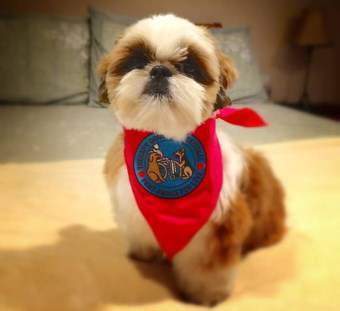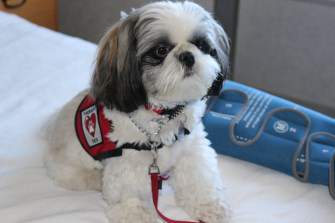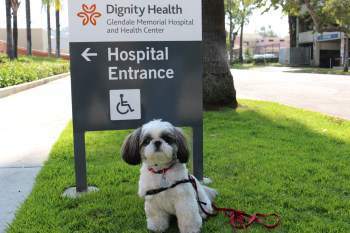Shih Tzu Therapy Dogs
Overview
Therapy dogs, encompassing all breeds and mixes, offer comfort to people in various settings like hospitals, nursing homes, schools, and disaster-affected areas. Unlike service or medical alert dogs, therapy dogs, accompanied by their owners, volunteer to bring joy and comfort during short visits.
This practice, initiated in 1976 by Elaine Smith, has grown significantly due to the positive impact on individuals facing illnesses, recovery, or loneliness. Visits from therapy dogs have been shown to reduce stress, lower blood pressure, and boost overall morale, all on a volunteer basis without financial compensation for the owners.
In this article, we cover:
- The qualities that make a Shih Tzu a good candidate for being a therapy dog
- What Shih Tzu therapy dogs do
- How to get your Shih Tzu ready to become a therapy dog
- An introduction to Gracie, an amazing Shih Tzu that is a certified therapy dog, along with a Q&A session with her human

Porter, a 16-month-old Shih Tzu from Saratoga, New York, and his human, Laura Toma, have been active as Therapy Dogs with Therapy Dogs International since May 2015.
They visit assisted living facilities and plan to extend their outreach to a school for children with developmental disabilities. Porter's mission is simply to spread love.
The Qualities of a Successful Therapy Dog
While every Shih Tzu is beautiful and each are endearing in their own way, not every Shih Tzu has the particular disposition that is needed to work as a therapy dog. With this said, when you look at the personality traits required for a dog to be a successful therapy dog, it is common for this playful, outgoing and friendly breed to embody them all:
- A genuine affection for all sorts of people.
Some dogs are super-lovable with their owners, but a bit shy or untrusting of strangers. For a Shih Tzu to work as a therapy dog, they must have a happy outlook towards everyone that they encounter, no matter the situation, and without needing to warm up to anyone.
- Ability to stay cheerfully calm.
To be successful working as a therapy dog, a Shih Tzu needs to be calm enough that new settings do not faze them and they do not get overly excited when meeting new people (such as barking or jumping up). This also includes the ability to handle sudden noises (hospital buzzers, loud voices, etc.) and the possibility of lots of people crowding around the dog.
- Aware of the needs of others.
While the sight of any cute dog will often be enough to make a person smile, working as a therapy dog goes way beyond this. If a Shih Tzu is cut out for this sort of work, they will naturally be alert to the needs of others, initiating contact with those that are shy and truly enjoy making connections that bring joy to others.
- Obedience. To earn a certification, there is quite a bit of testing that involves perfectly listening to commands (more ahead).
If You Think Your Shih Tzu Could Work as a Therapy Dog:
Steps that Lead to Becoming a Therapy Dog:

Gracie, 2 years, 10 months old, ready to see patients at the hospital
Pet parents: Steve & Carol
We'll see more of Gracie ahead
- A dog must be at least 1 year old
- The dog cannot have bitten anyone in the past
- The dog must have a clean bill of health and be up-to-date with all vaccinations
And, testing is quite extensive. Just some of this includes:
- The Shih Tzu must allow the evaluator to check all areas of the body, including paws and tail and the dog must show that he/she is fine with being touched.
- The Shih Tzu is walked by rooms with people in the hallways, displaying the ability to greet them and show friendliness.
- Owner and Shih Tzu must enter rooms a certain way: The owner enters first (to see if a particular person wishes to have a visit) and then the dog enters only if that is confirmed.
- Commands of 'Heel', 'Sit', 'Down', 'Come' and 'Leave it' are tested. This last one is perhaps the most difficult, since it involves a dog obeying the command to not touch food that's being offered to them and/or not drinking from a bowl of water that is placed on the floor. This is to keep the dog safe since a patient could accidentally offer medicine to a dog instead of a piece of food and liquid on the floor could be hazardous. The Shih Tzu must not even lick the food being offered and cannot lap at the water at all, or he/she will fail the test.
- The Shih Tzu must show a willingness to greet and be petted by a variety of people. This includes those in wheelchairs (the dog is put on laps for some of this), with crutches and with walkers.
- The Shih Tzu will be tested regarding distractions and their ability to stay by their owner's side and maintain their composure. This can include such things as someone dropping a heavy object or even someone skateboarding up behind the dog as they are being walked. At some point during the exam, there will be test volunteers letting out mock cries, moans and other such unsettling noises that one may encounter in a hospital setting.
- There will be a 3 minute period when the owner must step away out of sight. During this time, the Shih Tzu is expected to remain unfazed and is not allowed to bark, whine or show any agitation.
- The Shih Tzu will be tested as to how they reacts to other dogs (since other therapy dogs of any breed may also be volunteering at the same time).
In all, there are 13 tests, divided into 2 phases.
Any growling, snapping or biting will automatically disqualify a dog. Even such things as not immediately recovering from being startled, acting shy or licking the offered food will result in not passing the course.
If you register with Therapy Dogs International, you'll be given a manual and a DVD to be able to thoroughly practice with your Shih Tzu and then you can decide when you think he/she is ready.
Meet Gracie, a Certified Therapy Dog

Q&A with Gracie's Humans

A Final Note:
Let's be email friends...
More Articles for You:
Shih Tzu Dos and Don'ts - A great summary of the 3 most important 'dos' and the 3 most vital 'don'ts' for optimal health, happiness and well-being. It's always a good idea to reassess these elements as your Shih Tzu matures.
The Best Interactive Toys for a Shih Tzu - If you're looking for some great toys to help teach independent play or some ways for your sweetie to stay occupied when your focus is elsewhere, you'll love these finds.
